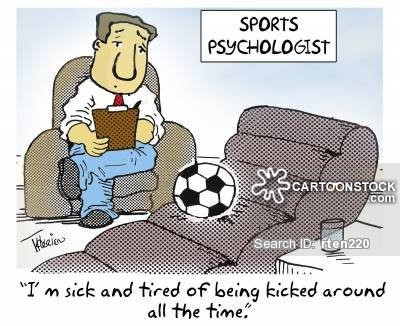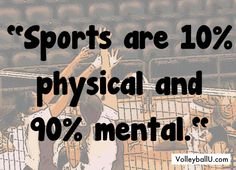Coaches play a key role in helping children develop how they think, their mental skills as well as their physical skills. Any sport requires more that just conditioning work or practising or performing the skills. Competitors have to think their way through their event.

In the past athletes used to learn from others and have to read from books to be able to give of their best. Today's athletes no longer have to battle along the path of trial and error. Coaches and athletes can turn for help to well-developed principles and training programs of applied sport psychology for related materials.
Mental preparation involves the design and practice of structured thinking approaches. Athletes often have to think and do certain things that are completely unnatural such as being focused and controlled when the entire stadium is going crazy trying its best to distract them.
Athletes sometimes waste a considerable amount of mental and physical energy worrying about things beyond their control. They should base their mental preparation on things they can control and spend time in training these skills.
By doing this they are able to approach the event with a much more focused and confident attitude. The key to mental preparation is to identify what can and cannot be controlled and then to work on those things that can be controlled. An athlete must have the correct frame of mind. It is your task to really get to know the athlete you are working with.
This preparation is not only a means of avoiding or recovering from disasters. It plays an important part in organizing practice and training effectively so that things go correctly in the first place.

What happens to an athlete's performance as his or her level of psychological arousal level increases?
Heart rate, blood pressure, respiration rate, tension levels, and so on, increase, performance increases to an optimal point and thereafter decreases at an alarming rate. This is of course the inevitable. The worried athlete, who worries about the result of the event, the other competitors, the condition of the venue, the weather, or recent poor training sessions, is definitely going to feel uncomfortable. He or she will be a victim of their own thinking.

Smart athletes realize that they do not have to change their personality to be an effective competitor, but they have to know how to control their tendency to react inappropriately at times during competitions. Athletes who have been taught how to control their emotional reactions will approach a competition confident of their ability to control themselves when things get tough.
You cannot control the motivation levels of your athletes. You can, however, assist athletes to continue to work towards desirable goals. Focusing on effort levels and what can personally be achieved is much more motivating than focusing on winning, which is dependent on many other uncontrollable factors.

Motivation means how much an individual wants to achieve a goal. You need to know what goals an individual has. The following are some reason for being involved in sport:
. to have fun
. to master new skills
. to make friends
. to become fit
. to experience excitement
Coaches should help athletes understand what they want to achieve, their goals and how they will achieve them.
Resources and Extra reading:
Coach's responsibility | Psychological skills for athletes | Sports psychology | Mental tools | Focus control | Mental toughness | Factors that impact training | Factors affecting performance | Athlete centred guide | Sports competitors | Coaching principles | Goal setting | Goal motivation

Great information post really like your posts keep posting
Downvoting a post can decrease pending rewards and make it less visible. Common reasons:
Submit
sport makes the world a better place
Downvoting a post can decrease pending rewards and make it less visible. Common reasons:
Submit
Really great post! I actually never thought about the psychological development of a child when they are attending a practice. I was swimming consistently 5 days a week at the age of 5. This was for 1.5 hours, and I loved it. Mary Fuller, my swim coach for over 13 years has had plenty of time to effect my mentality. She did a good job. As I competed nationally multiple times and have carried the skills she taught me into other fields of my life.
Thanks for the info! Keep Steeming!
Downvoting a post can decrease pending rewards and make it less visible. Common reasons:
Submit